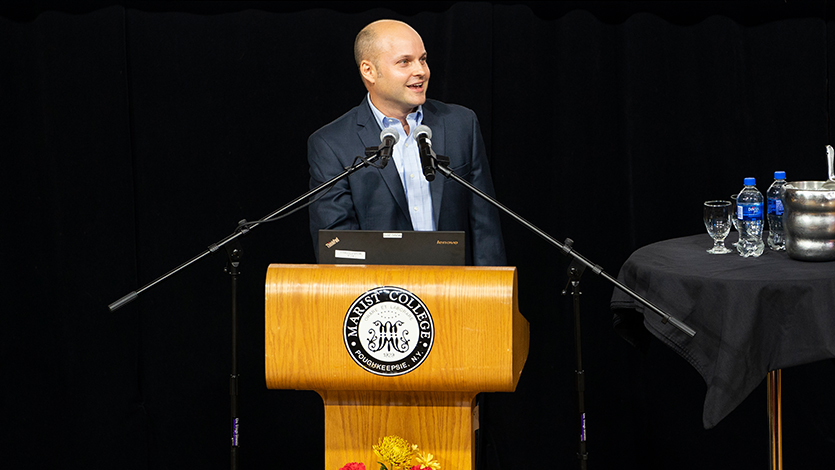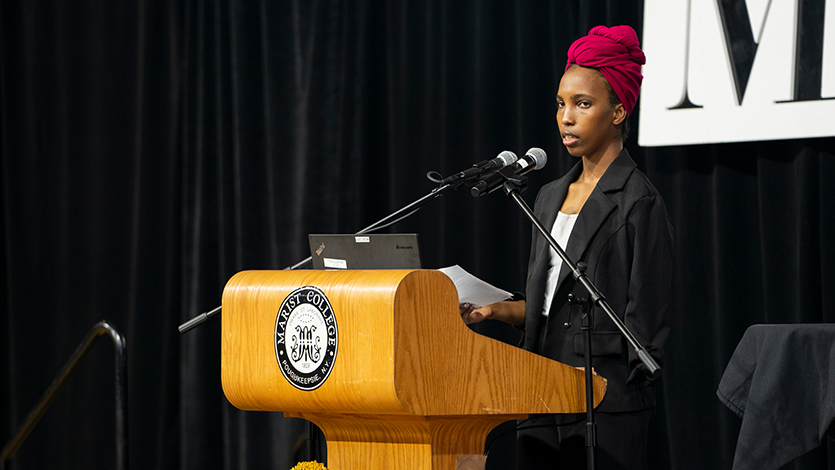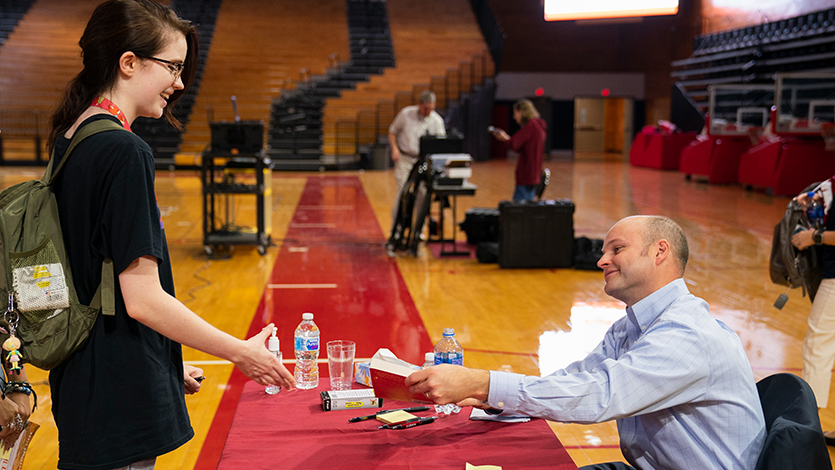It Takes a School: Inspirational Common Reading Book Has a Special Marist Connection

October 8, 2018 - On September 26, Marist welcomed author Jonathan Starr to campus to deliver the College’s sixth annual First Year Seminar Lecture. Starr’s book, It Takes a School: The Extraordinary Story of an American School in the World's #1 Failed State (Henry Holt and Company, 2016), is the inspirational story of how Starr, a former hedge fund manager, overcame all odds to start the high-achieving Abaarso School of Science & Technology in Somaliland. The book is required reading in 2018-19 for all Marist freshmen, and the author shared his reflections before a crowd of more than 1,000 students, faculty, and staff in the McCann Center Arena.
According to the Abaarso School’s website, “It started as an abstract vision in 2008 – to build a transformative school in a place the world had written off as hopeless.” Indeed, Somaliland, which declared independence from Somalia in 1991 after a brutal civil war, is a land with many challenges. Not recognized internationally, Somaliland still feels the impact of the wartime years, including “unemployment at over 75% and critical challenges in core infrastructure areas such as sanitation, water, energy/electricity, roads/highways, and education.”
This dire situation, and the desperate need for educated Somalis to help solve it, was the impetus for Starr’s vision of a co-educational boarding school to produce forward-looking young leaders. The results have been spectacular. Last year, Abaarso had 1,500 students vying for just 50 spots at the school. It is accredited by the New England Association of Schools and Colleges, only the 11th school in Africa to earn this distinction. Its graduates have gone on to attend some of the world’s most prestigious universities, including Harvard, Yale, MIT, Wellesley, Amherst, and Oberlin. To date, more than 100 Abaarso alumni have studied abroad, earning $23 million in scholarships and financial aid.

The Abaarso School was an unlikely story from the beginning, related Starr, who graduated from Emory University in Atlanta and worked for a time in finance after graduation. “I wasn’t Somali or Muslim, and I didn’t have any background in education. People were suspicious. At first, they didn’t believe that our students would get scholarships abroad. Then they said they wouldn’t be able to compete. Then they said they wouldn’t return to Somaliland.” Starr and his students have proved the naysayers wrong, and some Abaarso graduates have even returned to teach at the school. “The little school that could” has attracted international praise and attention, including coverage by The New York Times, The Wall Street Journal, The Boston Globe, and the BBC; Anderson Cooper even visited the school for a “60 Minutes” segment and chronicled his observations there.
To what does Starr attribute Abaarso’s incredible success? First, he said, the school provides both an escape and an opportunity for greatness to kids who grow up with neither hope nor a future. He observed, “In Somaliland, many girls are married off at 14, and many boys feel compelled to make the dangerous trek across the Mediterranean in search of job opportunities in Europe. We’ve succeeded because the alternatives in Somaliland are so bad and the potential is so amazing.” In addition, he has found that Abaarso students are deeply cognizant of the unique opportunity they have, and they don’t allow themselves to fail because they feel the weight of others’ expectations on their shoulders. Starr added, “Our results are exceptional, but we were likely to succeed. Not because of talent or luck, but because of our refusal to accept anything less than success.”
That sense of perseverance and following your passion is one of the many lessons Starr shared with Marist students in the audience. He noted, “People thought our idea was impossible because it had never been done before. This is true for any new idea. There will always be people opposing you, and it will be hard, but you won’t stick with a project unless it’s highly meaningful to you. Don’t see something for what it’s not – see it for the possibilities it offers.”
The Abaarso-Marist Connection
Professor of History Robyn Rosen, who directs First Year Seminars, commented on the choice of It Takes a School as this year’s common read. “The committee was so excited to use this book because of the inspiring story of Jonathan and his students. The fact that we had Abaarso alumni at Marist was the icing on the cake! The book offers students insight into the challenges and rewards of social change, reinforces the value of education, and models perseverance.”

In a particularly meaningful moment, Starr was introduced by Qadan Mohamed ’19, a member of Abaarso’s second graduating class. Mohamed, an Honors Program psychology major with minors in business and cognitive science, is the first in her family to attend school and is at Marist with the help of a scholarship from the MasterCard Foundations, a recruiting partner with Abaarso. Mohamed considers Starr part of her family, and quoted poet Maya Angelou in describing Starr’s influence on her: “He helped me to feel comfortable being me and opened my eyes to what I might accomplish.” She plans to return to Somaliland after graduation to start a Montessori school offering other young Somalis educational opportunities like the ones she has enjoyed. Another Abaarso graduate, Amal Mohamed, is a 2018 alumna of Marist, having completed her undergraduate degree with a major in communication and a minor in psychology.
Starr spent a considerable amount of time with Marist students during his week-long visit to campus, and he is working especially closely with the Honors Program. Said Associate Professor of Philosophy and Honors Program Director James Snyder, “In many ways, Jonathan has become part of the Marist community through his advocacy for his students and through his work with our Honors students. He has been generous with his time and knowledge, teaching two master classes on leadership and meaning in life. No first year author has ever had this level of commitment before, and we definitely look forward to working closely with Jonathan in the years to come.”
In addition, Starr has committed to a semester-long project with students in Marist’s Honors Program this fall. Explains Snyder, “Jonathan will be working directly with our Honors students on credit-bearing research projects that both develop important skills in our students and drive the social good. With guidance from Jonathan, the students will be creating educational games and videos that will be translated into Somali for use at the Abaarso School. This is an invaluable experience for our students and is unlike anything we have done with research in Honors.”

About The First Year Seminar and Common Reading
The First Year Seminar is the linchpin of the Marist educational experience, introducing students to the College as a learning community and offering them a wide range of topics designed to expand their academic horizons. The campus-wide Common Reading provides a touchstone for First Year Seminar courses and for events and conversation throughout the Marist community as a whole. The Common Reading is chosen by a committee that includes faculty from across the College and a student representative. Past Common Reading selections include Rebecca Skloot’s The Immortal Life of Henrietta Lacks (Crown, 2010), Wes Moore’s The Other Wes Moore (Spiegel and Grau, 2011), and Reyna Grande’s The Distance Between Us (Washington Square Press, 2013).



